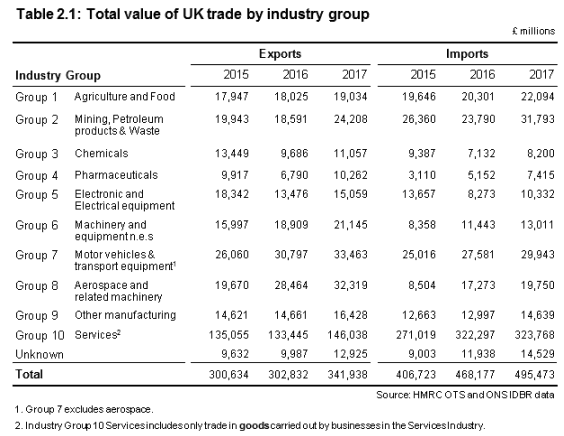Almost three-quarters of UK manufacturers have reported that Brexit is causing damage to long-term strategic planning and future business prospects.
That’s the Brexit headline from the latest Annual Manufacturing Report produced by The Manufacturer in which 71% said Brexit uncertainty is damaging strategic planning and business prospects.
Commenting
“Post-Brexit, a triple blow of higher import costs, added paperwork, and a likely recession.”
And the number of manufacturing firms who believe Brexit will cause severe disruption for the manufacturing sector in the UK has grown. In last year’s report, some 54% of respondents felt that Brexit would cause severe issues for their business.
That figure has now grown to 64% over the last 12 months.
However, and interestingly, 35% of firms don’t believe Brexit will cause any chaos and that leaving the EU will trigger a period of growth and further investment.
Read more: Nearly half of UK forms not prepared for chaotic Brexit
And in the face of adversity, manufacturing heads are optimistic about the industry’s ability to pull through, with 77% saying that, whatever the outcome of Brexit or the type of Brexit we will see, the UK as an industrial nation has the drive to succeed.
How prepared is your business for Brexit?
Whether you’re a big firm or small business, Brexit is likely to cause some level of upheaval, and every business needs a plan to ensure
If your business is yet to conduct a Brexit audit and format a post-EU membership
Find out more about our Brexit consultancy here.
In the event of a no deal Brexit, it could take seven years to re-establish frictionless, tariff-free trade between the UK and EU.
That’s the opinion of two leading EU law specialists who have warned that it might not be as simple as it sounds to simply default to World Trade Organisation tariffs should the UK crash out on 29th March.
Anneli Howard, EU and competition law specialist at Monckton Chambers and a member of the bar’s Brexit working group said to The Guardian that: “No deal means leaving with nothing.
“The UK will need to set up new enforcement bodies and transfer new powers to regulators to create our own domestic regimes.
“Basic maths shows that we will run out of time but any gap in our system will create uncertainty or conflict. Negotiating and ratifying international free trade deals with the rest of the world alone could take over seven years.
“The UK will have to start negotiating over 50 free trade agreements from scratch once we leave the EU. In the meantime we will have to pay tariffs.”
It’s a pretty dire assessment of what could be to come if Theresa May cannot convince the EU to backstop concessions and latterly Parliament to agree to whatever concessions she’s able to secure.
But, naturally, there are some with a more optimistic outlook. Professor of international economic law at City University of London, David Collins remarked that: “The UK can trade quite easily on an uncertified schedule.”
And it’s also worth noting that no deal is still, even at this late stage, possibly still an unlikely outcome. EU negotiations go down to the wire all the time, made apparent by the BBC’s Inside Europe documentary, so we could see a deal agreed at 11:55 pm on March 28th. We could also see an extension to the negotiation period should there be a serious impasse but some light at the end of the tunnel in sight.
You’d like to presume that the government wouldn’t take the UK out of the EU on the morning of the 29th March if both they and the Donald Tusk et al felt another two/three days of talks would see an agreement.
However, it wouldn’t be the first time, second time or even the 100th time that the Brexit process from the referendum to now would have both UK businesses and the population as a whole still clueless as to what’s going to happen next.
Where next for UK businesses
So put simply, we still don’t know where we stand as businesses who rely on the import of goods and export sales. The potential outcomes and routes through Brexit are the same as they were two years ago – deal, no deal or delay. It still seems evident that the prospect of remaining or a People’s Vote with the view to remaining are notions by the wayside as technical possibilities, despite vocal support.
So for businesses looking to prepare for exit, the playing field is pretty much as we were – just with an ever-nearing deadline.
But with nearly half of UK firms not prepared for a chaotic Brexit according to the Bank of England’s most recent inflation report, there is still much planning and preparations to be done for UK firms as Brexit day looms large.
How to plan for the no deal scenario

First port of call is to make sure your business has the right documentation and goods passports in place to continue trading with the EU.
One of these includes an Economic Operator Registration and Identification number, which some businesses will require in order to apply for customs simplifications and to submit import and export declarations.
Read more: UK firms trading with EU urged to apply for EORI number in preparation for No Deal
Secondly, make sure you have enough critical supply of key components should trade and customs disruption follow from the 29th March.
This approach has been labelled fearmongering by some, but for businesses, especially within the manufacturing, food production and pharma industries, it’s critical for operations to ensure that components and parts that are imported from Europe are readily available to ensure no hold-ups in output.
In fact, the same BoE inflation report found that two-thirds of firms it quizzed said they’d begun building up stock and taking out extra warehousing space – and that rate of stockpiling is increasing.
And it’s not just worried businesses that are ensuring key supplies are ready and waiting should disruption occur following the 29th March. After all, it was just this week that it was reported that the NHS was stockpiling body bags.
But perhaps the most important step, and the one you should carry out immediately if not already done so, is talking to your customers on the continent.
Whether you sell the final product or service, or you deliver key components across The Channel, they will be having the same concerns as you are… but they have close neighbours and a local marketplace to turn to for alternatives should they feel the need.
Come Brexit day, the last thing you want to see when opening your inbox, in the event of a no deal exit, is a tirade of emails from key EU customers saying they’ve found alternative arrangements.
So talk to your customers, let them know your own contingency plans and reassure them that your potentially decades of doing business together will not stop because of Brexit, and your company stands ready to make adjustments to ensure as seamless
As Go Exporting CEO, Mike Wilson wrote in an article for Cheshire Media; “It is imperative that you talk with them now to find out their concerns, analyse together where the pinch points may arise and work through a solution. Re-assure them that you are prepared and that they can rely on your company to deliver.”
Still concerned?
Well, you’re not alone. Even those businesses that have invested millions into pre-Brexit planning and contingencies are concerned. But what’s critical is to ensure you have a plan in place to cover all the potential outcomes.
Creating action-plans that can be implemented from the 29th March as the picture becomes clearer is the best way to help safeguard your import-export business in the days running up to Brexit.
If your firm needs support and expert guidance on preparing for Brexit, you can read more about our Brexit consultancy services.
UK businesses exporting or importing with the EU have been urged by HMRC to apply for an Economic Operator Registration and Identification number so they can continue trading in the event of a No Deal Brexit.
With Theresa May’s deal set to be voted on by Parliament tomorrow and the rhetoric having advanced to a ‘my deal or no deal’ stage, many large exporting firms have already started enacting their own no deal preparations in advance of the Brexit outcome.
This latest advice, published early December, aims to help ensure businesses are ready to continue operating across borders should the UK exit the EU without a deal.
In such a scenario, it’s more than likely that the same processes that apply to international trade will then apply to any and all trade with the EU as well. However, the requirement for an EORI isn’t required for exporting goods to and from Ireland or across the Northen Ireland – Ireland land border.
Learn more about and find out how to apply for an EORI number here.
British businesses will also require an EORI number in order to apply for customs simplifications and to submit import and export declarations.
Whilst large, global exporting firms will already have an EORI number as a requirement for trading in territories outside the EU, smaller or more specified operations that have only ever traded within the EU block will likely need to apply.
Businesses urging last-minute deal agreement

It will have been nearly three years since the EU referendum that the UK leaves the EU on 29th March, with or without a deal. And for businesses, in particular, as the deadline loomed ever closer, it’s been an uncertain time with millions being spent in Brexit readiness.
And as Theresa May’s deal finally goes to the vote in Parliament tomorrow, bosses at some of the UK’s biggest manufacturers and employers have voiced once again their desire to see a deal agreed in the interest of business certainty and limiting disruption.
Read more: Do businesses really back the current Brexit agreement?
Today, Toyota Europe’s Dr Johan van Zyl reiterated his support for the Prime Minister’s deal, just days after Jaguar Land Rover and Ford announced thousands of redundancies across UK sites.
He said that: “We’ve said since the start of the Brexit discussions that we would like to see trade without any duties or tariffs, and of course we would like to see a regime where the regulatory framework is the same between the EU and the UK.
“That for us is what is really required to make sure that our operations can continue as they are at the moment.
“The big thing about [the] deal that is on the table is that it really allows us to keep our competitiveness. But if we put any friction or tariffs into the system, that will impact our costs and that will affect our competitiveness.”
Is your business Brexit-ready? If not, there is no time to lose to ensure your firm is prepared for any and all eventualities.
Find out more about Go Exporting’s Brexit Consultancy.
The Department for International Trade’s Export Strategy is to be reviewed by the International Trade Committee as part of an inquiry into the department’s support for exports.
Chair of the Committee, Angus Brendan MacNeil, said the inquiry will look to review the strategy and ascertain whether or not it offers ‘sufficient levels of support to UK businesses wishing to export’.
A number of questions have been submitted to the DiT, including whether or not the Government is effectively identifying and resolving market access barriers faced by UK exporters and how effective the GREAT campaign has been at promoting UK products and services overseas.
There are also requests for written submissions regarding the DiT’s view on the effectiveness of UK Export Finance to support companies looking to export and also whether the DiT’s export service in its entirety is fit for purpose and sufficiently resourced.
Of the inquiry, Mr MacNeil said that: “Exports are the lifeblood of the UK economy, and in August, the Department published its new export strategy. Regardless of whether the UK has the ability to strike new trade deals around the world after Brexit, promoting and supporting UK exports remains a core task.
“In this inquiry, my Committee will examine whether the plans that have been set out in the Government’s strategy provide for sufficient levels of support to UK businesses wishing to export.
“We will also be looking at the effectiveness of the ‘Exporting is GREAT’ campaign, and whether the Government has set itself realistic targets, especially given the uncertainty around how the economy will fare after Brexit.”
What is the Export Strategy?
The Government’s Export Strategy was launched in August last year and set to lay the ambitious, visions and way forward to further improve the UK’s export prowess around the world.
In the Strategy, it noted that the UK is punching above its’ weight but below potential and the ambition to raise exports as a percentage of GDP from 30% to 35%.
On Brexit, the Strategy noted that: “Leaving the European Union means we can pursue an independent trade policy for the first time in four decades, which we will use to maximise our trade opportunities across the world and deliver benefits for business, workers and consumers around the whole of the UK.”
However, the level of Brexit advice in the exporting strategy is also set to be analysed, with one of the quests from the International Trade Committee quizzing whether the strategy is sufficiently tailored to markets with particular potential in the post-Brexit trading environment and if it’s fit and ready to resolve the challenges that exporters will likely face due to the new relationship with the EU.
A new survey has found that UK SMEs are still hungry for international trade success in the face Brexit uncertainty.
The research, called the UK SME Confidence Survey, commissioned by OFX and conducted by OnePoll, quizzed 500 UK SMEs owners and senior managers with employee counts ranging from 10 to 249.
It found that 46% of those asked said Brexit had had no effect on their hunger for international trade.
Interestingly, there was a switch in primary market focus too. In 2017, the USA was cited as the most attractive market for exports at 62%, but this year’s confidence survey saw the USA stand at just 36%.
Europe, conversely, fell back into favour with 45% of those quizzed this year suggesting Western Europe was their favoured growth market, compared to just 20% last year.
The OFX report summarised that: ”Again, it seems that Brexit-related uncertainty is no longer holding small businesses back from their EU trade ambitions.
“Despite the uncertainty surrounding the terms of Brexit, small British businesses are increasingly optimistic about international trade.
“In fact, the majority expect to increase overseas sales in the next year. And it’s not all talk. Since 2017, 47% increased overseas sales, growing international revenues by an average of £50,000.
“It’s good to know that political uncertainty hasn’t dampened the spirits of UK businesses.”
Perhaps not surprisingly, business owners in regions favoured leaving the European Union during the referendum in 2016 were most confident and optimistic about international sales now. This manifested itself in the survey results where England-based responders, where the Leave vote was highest in the United Kingdom, were the most confident, with 72% saying they were optimistic about future international trade compared to just 40% of responders from Scotland-based firms, for where the referendum result was firmly in favour with Remain.
Read more: 10% of UK SMEs now exporting
Despite the divisions in future export and international trade confidence though, one thing that united all four nations’ small businesses was the confidence in the ‘made in Britain’ brand. Over half (53%) of those asked said that the ‘Britishness’ of their brand and products was an invaluable asset when selling services and goods internationally.
Eight of the UK’s 10 industry groups saw export growth between 2015 and 2017 according to the latest data released by HMRC.
The data, compiled from the Overseas Trade Statistics and Office for National Statistics, found that 151,000 UK firms exported goods and employing some 9.7m staff.
Of the 10 industry groups, just two saw negative growth in export value; electronic and electrical equipment and chemicals.
The largest growth between 2016 and 2017 was seen in the pharmaceuticals sector, followed by mining, petroleum products & waste and aerospace. The chemical industry also saw a healthy increase between 2016 and 2017, offset by a larger 28% decline between 2015/16.
Industries seeing the largest import growth included pharmaceuticals and mining, as well as electronic goods.

(Source: UK trade goods in statistics by business characteristics 2017)
Each and every industry group saw more short-term growth between 2016 / 17.
Business strength in the face of Brexit
This latest data set from HMRC makes for an interesting read, and a positive one too.
Firstly, whilst some sectors including most notably chemicals and electronics saw marked declines between 2015/16, every sector experienced growth thereafter. That’s despite the EU referendum result in late June of 2016 and ongoing uncertainty and negotiations the year after.
Stalwarts of UK industry including aerospace, pharmaceuticals and vehicles continued to see growth – a positive sign before the UK officially leaves the EU in March next year.
Overall, the total value of exports saw an extremely healthy 13.7% growth, highlighting both the ambition, confidence and success of exporting UK firms throughout the Brexit process.
And despite one in 10 UK SMEs now exporting around the world, 72% of the total value of exported goods is generated by a smaller percentage of more experienced firms over 20-years-old.
Read more: 10% of UK SMEs now exporting
This data, combined with other further data released recently as part of the Annual Business Survey, shed a positive light on the UK’s international trade and the increasingly international outlook for SMEs and start-ups too.
(Image by Pkuczynski)
When Theresa May left the CBI conference last week she would have been forgiven for believing that businesses were on her side when it came to the Brexit deal she’s brought back from Brussels.
Indeed, the CBI’s deputy director general, Josh Hardie, said in a statement that: “It appears that we’re on the cusp of a much-needed agreement. This shows that a deal can be done and businesses across the continent will be watching this weekend’s EU summit closely.”
But all may not have been as it appeared.
Internal emails from the CBI suggests that support for the deal from the organisation that positions itself as the ‘Voice of Business’ is far from unwavering, and certainly not that any deal and some semblance of a clear route forward is always the best option.
Indeed, the CBI’s head of EU negotiations inadvertently included ITV news in an internal email thread to colleagues which suggested as much whilst discussing a draft statement regarding post-Brexit partnerships.
In it, Nicole Sykes said: “no need to give credit to negotiators I think, because it’s not a good deal” and then received a reply from Christopher Grummet, head of news at the CBI, saying “Tweaked. Have left the credit in given we ‘want’ this to go through”.
Naturally, the CBI was not best pleased that such emails had reached the public. In a statement, it said that: “It’s absurd ITN has reproduced a private debate in the full knowledge that it is not the CBI’s position.
“Responding to significant announcements inevitably involves a step-by-step process, testing different viewpoints before arriving at a final, public statement.
“The CBI and our members have been clear. The deal’s not perfect, it involves compromise, hard work lies ahead but right now it is the best chance of protecting jobs and growth.”
So what do business really think about the deal that’s currently on the table? The one which Theresa May is spending her time marketing to the British people and politicians and one that the EU has strongly hinted it is unlikely to now deviate from.
The boss of Rolls-Royce was one of the first to praise the agreement and urged politicians to back the ‘practical’ agreement Theresa May had negotiated.
“We are slightly running out of time and I would, as a business leader, like to see politicians on both sides of the fence get on and negotiate a practical deal that works for business,” Mr East said.
BMW was on the same page as well with the car maker welcoming the deal, saying it was a ‘positive step in the right direction’ to avoid ‘the worst-case scenario which is what a no-deal Brexit would represent.’
Read more: Politicians should get behind ‘practical’ if not Rolls-Royce of Brexit deals
But whilst many firms within the manufacturing sector support the current proposals, others aren’t so keen.
Vocal Brexiteer and boss of Wetherspoon pub chain, Tim Martin, said on LBC radio this week that the UK would be better off with no deal at all.
He said that: “When the dust has settled and we can see what Theresa May’s deal is, we can see that no deal is much better than a deal.
“On day one, on the 29th March if we don’t sign up for a deal, we’re £39bn better off, which is £600 per person in the UK.
“Everyday that goes by if we don’t get out of the EU on 29th March we’ll continue to pay hidden tariffs on rice, oranges, wine, coffee, lots of things, every single day.”
A deal with no backing?
One of the main sticking points for which detractors of the current proposed deal are basing their arguments on is that the numbers in the House of Commons currently don’t add up for the Prime Minister and the deal may fail to pass parliament. Back to square one and, like with the majority of the Brexit journey, entering uncharted territory.
But that could change, especially in the eyes of education secretary Damian Hinds who defended the plan, in particular against an alternative of leaving the EU without a deal at all.
He said that “The deal that we have on the table is a strong deal. It is a good, balanced deal. As people reflect on what the alternatives are, I think people are going to come to see this is a very good deal for Britain.
“If we weren’t to pass this deal, I think it becomes rather unpredictable what happens next. There is a risk on the one hand beyond that of no Brexit at all – and there are people trying to thwart Brexit – and there is also a risk of no deal.
“Neither of those two things are attractive. This is why I believe this deal, which is a strong deal, will gain more and more traction.”
Read more: Brexit consultancy
What are your views on the deal? Will it help or hinder your business? Or are you simply pleased that there is a workable deal on the table and, should it receive a positive vote in parliament, the likelihood of a no-deal Brexit is starting to dim?
Share your thoughts in the comments below.
The boss of Rolls-Royce has urged politicians to back Theresa May’s draft Brexit agreement with time running out to agree any alternative.
Joined by many other business leaders who came out publicly to back May’s Brexit plan, Mr East mirrored the sentiment of thousands of company leaders up and down the country in calling for a practical approach to ensure a no-deal scenario is avoided.
In an interview with the BBC, Mr East said of this week’s events that: “The time since the referendum seems to have gone remarkably quickly and we’re essentially [still] having a discussion we could have had the morning after the referendum.
“We are slightly running out of time and I would, as a business leader, like to see politicians on both sides of the fence get on and negotiate a practical deal that works for business.”
Rolls-Royce, who employ over 22,000 people in the UK across aerospace, submarine and marine sectors alone, is just one of thousands of manufacturing firms concerned that just-in-time supply chains may break under a hard exit from the European Union, calling for ‘as little change as possible’ from the current close export and trade ties with the block.
Elsewhere, BMW welcomed the draft exit agreement brought back from Brussels, stating it was a ‘positive step in the right direction’ to avoid ‘the worst-case scenario, which is what a no-deal Brexit would represent’.
May out to sell her deal
It’s been a busy week for the Prime Minister with a five-hour Cabinet meeting and three-hour session in the Commons followed by a raft of ministerial resignations, a further statement outside Number 10 and even a birthday bash for Prince Charles.
Since Wednesday, May has been in campaign mode to drum up public support and understanding for the deal she’s managed to agree, whilst also thwarting questions about votes of no confidence and leadership contests.
Indeed, political support whilst invisible during the hours immediately following the announcement of the agreement has started to emerge, including MP Therese Coffey stating that May’s draft agreement is ‘what businesses are looking for’ and is ‘confident that when people get into the full detail and what that actually means, many more will endorse it’.
But the main sticking point for Brexiteers and the public right now is the customs arrangement as part of the Northern Ireland backstop for which there’s a seeming lack of clarity on how, if triggered, this can be exited in the years ahead.
Read more: As Brexit text is agreed, business warn they cannot afford a no-deal
A full Brexit agreement could be close, but it could equally be an impossible goal should political motions within the Conservative Party itself look to oust the PM with the view to negotiating the deal, something which the EU has said it’s not at this stage inclined to do.
And Bruno Le Maire, France’s economy minister, had little sympathy for the UK’s position, stating: “The British politicians, who have argued for Brexit, now have a choice between reneging on their absurd political promise or an economic disaster of which the British people will be the first victim.”
Until next week…
Huge Brexit news this afternoon and evening as UK and EU officials confirmed that they have agreed a draft Brexit ‘text’. Talks between Theresa May and her cabinet members have been held today before further discussions tomorrow afternoon.
The news saw the pound surge against the dollar and the euro, though the cabinet and then Parliament itself must agree on the deal – the technical details of which only a handful of government ministers are yet to have seen.
But this draft Brexit agreement may have arrived just in the nick of time not just for the negotiating schedule and Theresa May but also UK businesses, for which confidence has been seriously waining over the last 12 months in particular.
Read more: SME firms suffering crisis of confidence
Numerous reports and companies themselves have confirmed that they’re delaying investment until the future is clearer, with recruitment levels dropping back too. In fact, it was only today that the latest ONS figures indicated the first decline in employment levels this year with those out of work rising by 21,000 to 1.38 million.
That’s despite hundreds of businesses saying there’s now a serious shortage of migrant workers in the UK and vacancies are becoming harder to fill. Gerwyn Davies of CIPD who conducted the research said that: “The data implies that the pendulum has swung away from the UK as an attractive place to live and work for non-UK-born citizens, especially non-EU citizens, during a period of strong employment growth and low unemployment.
“This has heightened recruitment difficulties for some employers.”
Yet, whilst a draft text has been confirmed, the Prime Minister still faces what is likely to be an even bigger hurdle in these negotiations – opposition parties and Brexiteers within her own party, many of which have been quick to jump in front of cameras this evening to lay their positions and likelihood of voting against whatever the draft agreement may be.
In reality, a deal is within the grasps of Number 10, but no-deal is still a real possibility if what’s on the table as the cabinet meets tomorrow afternoon fails to satisfy anyone in the room.
But businesses say they cannot afford a no-deal scenario. Firms, including the owner of Oxo, Bisto and Mr Kipling, have already started to stockpile ingredients and supplies in case of no-deal and gridlock at UK ports.
Other businesses are calling for the government to put in place similar private sector bail-out plans to that of the 2008 economic crash to avoid wide-scale bankruptcies.
The IoD’s Allie Renison said: “As long as it remains government policy to potentially walk away, it is incumbent on them to make further provision to help firms be fully ready for the consequences of that outcome.”
Read more: Have UK manufacturers already lost out because of Brexit?
And one of those provisions, according to the chief executive of the Food and Drink Federation, Iain Wright, should be government bailouts of private companies.
He said in an interview with Politico that: “If the UK does fall over the Brexit cliff edge, ministers must leverage the government’s financial muscle … in rather the way they did for the banks during the crash.
“If the government was to say no now there would be a very big question from British industry: ‘You were prepared to fund the banks who brought the crisis on themselves… but you’re not prepared to support British business which is completely innocent of any fault in the current circumstances?’”
Some have already started preparing to support businesses within their umbrella who may need support. RBS has put aside £2 billion to support SMEs through Brexit if required.
But with the IoD reporting that just one-third of its 30,000 members have contingency plans in place should there be a hard or cliff-edge Brexit, it is still paramount that businesses take it upon themselves to ensure they’re ready and prepared for any eventuality – however close to midnight the Brexit clock strikes.
If your firm is yet to put in place actionable Brexit plans and procedures and you rely on export sales or import supply, find out how we can help right here.
The Brexit saga continues…
The number of small and medium-sized businesses in the UK expecting growth has dropped to its lowest point in nearly 10 years according to a new report.
The research called the UK SME Manufacturing Barometer, conducted by SWMAS found that 13% fewer firms asked expected to see their revenues increase over the next six months.
Two in 10 manufacturers reported they expect a drop in sales between now and March next year, whilst 28% have already seen a sales decline in H1 2018.
The drop in SME confidence and an evident decline in current sales levels for some is starting to have a knock-on effect on investment, with under 40% set to increase in their firms’ and a 12% fall in the number of small-medium manufacturing firms looking to recruit more staff in the immediate future.
Managing Director of SWMAS, Simon Howes said of the research findings that: “What we are clearly witnessing is manufacturers putting the brakes on new investments and recruitment whilst some enter survival mode caused by ongoing Brexit uncertainties.
Read more: Have UK manufacturers already lost out because of Brexit?
“However, we are also seeing signs that suggests our SME manufacturers are looking at their own ways to change and adapt to meet the Brexit challenge, such as intentions to start exporting or to export more, development of new products and improvements in efficiency and productivity.”
The good news and potential opportunities
Whilst this latest UK SME Manufacturing Barometer paints a rather bleak picture, there are still causes for optimism.
For example, 51% of the businesses questioned do still expect to see revenues grow over the next half-year.
And away from this latest research, the last 18 months has been extremely strong for UK exporters as a whole.
UK exports reach record levels last year, topping £616bn with marked growth in both good and service exports. Interestingly, 55% of total export value was derived from outside the EU market.
Internatl Trade Secretary, Liam Fox noted that: “British goods remain in global demand as exports to non-EU countries continue to grow.
“It shows the confidence the world has in our goods and is important as 90% of growth in global trade will come from outside the EU.
A further annual report conducted by the OFX found that, whilst confidence may be slipping according to the above data, some 62% of 500 business owners it quizzed said they were confident of achieving sales and doing business outside of the UK with a further 46% of SMEs specifically saying that Brexit was yet to affect their desire to grow through exports over the coming years.
Read more: Meet the sectors not overly concerned about Brexit
And the opportunities for businesses yet to begin exporting are more than apparent. Last year, the average international revenues for UK businesses topped £50,000 with a 47% increase in overseas sales in 2017 compared to the year previous too.
Mike Wilson, CEO of Go Exporting comments that: “Much as I mourn the decision to exit the EU, Brexit need not be negative, act now and plan properly and it could open a world of opportunities.”
Go Exporting has helped companies open new markets around the world, from Germany to Canada and Saudi Arabia. Find out how we could help your business grow on the international stage through our export consultancy.









